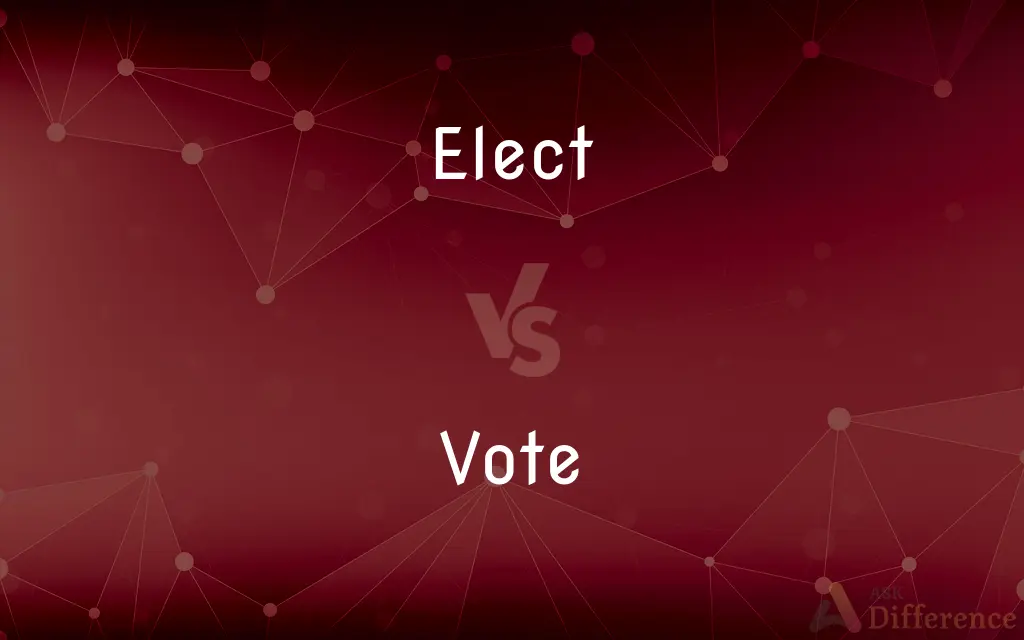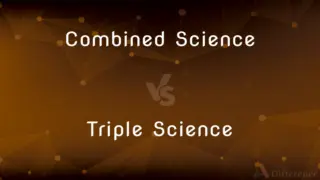Elect vs. Vote — What's the Difference?
By Tayyaba Rehman & Urooj Arif — Published on June 29, 2024
Electing involves choosing a candidate for a position through voting, while voting is the act of expressing a choice among options in an election or decision-making process.

Difference Between Elect and Vote
Table of Contents
ADVERTISEMENT
Key Differences
Electing is the process of selecting a candidate or option for a specific position or role, often in a formal setting such as a political election or organizational decision. It is the culmination of the voting process, where the option or candidate with the most votes is chosen for the role. On the other hand, voting is the act of casting a ballot or making a choice among various candidates or options in an election, referendum, or decision-making process. Voting is the mechanism through which preferences are expressed and recorded.
Election results are determined by the method of voting employed, which can vary significantly across different contexts, including majority vote, proportional representation, or preferential voting systems. While the act of voting is the individual expression of preference, electing is the collective outcome of these individual acts, determining who or what has been chosen. Conversely, the method of voting can influence the strategy of electors, as different voting systems can lead to different outcomes for the same set of votes.
Electing often involves a formal process with established rules and procedures to ensure fairness and transparency. This process may include nominations, campaigning, and finally, the voting by which the election is decided. In contrast, voting can be as simple as raising a hand in a small meeting or as complex as filling out a ballot in national elections. The simplicity or complexity of the voting act itself does not necessarily reflect the importance of the decision being made.
The terminology used in the context of electing and voting can also differ. For example, one might say, "We elected the president through a democratic vote," highlighting that 'elect' refers to the result and 'vote' to the method. While both are essential components of democratic processes, voting is the individual action that leads to the collective outcome of electing.
In democratic societies, the right to vote is a fundamental principle, ensuring that citizens have a say in who represents them and how they are governed. Electing, on the other hand, is the process that translates these individual expressions into a decision or choice of representation. This distinction emphasizes the participatory nature of democracy, where the act of voting enables the process of electing, shaping governance and leadership.
ADVERTISEMENT
Comparison Chart
Definition
The process of choosing someone for a position or role.
The act of expressing a preference among options.
Outcome
Results in someone being chosen or selected.
An individual expression of choice.
Process
Involves nominations, campaigning, and voting.
Can be a simple act or involve complex systems.
Context
Formal settings like political elections or organizational roles.
Applies to a wide range of decision-making scenarios.
Influence
Determined by the collective outcome of voting.
Influences the outcome of elections through individual choices.
Compare with Definitions
Elect
To choose someone for a position by voting.
The party will elect its leader at the national convention.
Vote
The act of choosing among options in an election.
Every citizen above 18 has the right to vote.
Elect
Results from a majority or plurality of votes.
She was elected mayor with 60% of the vote.
Vote
Expresses a personal or collective preference.
The referendum was decided by a public vote.
Elect
Translates collective voting into a decision.
After the vote, the committee elected to change the policy.
Vote
Essential part of democratic processes.
Voting in elections is a civic duty.
Elect
Can apply to various positions and contexts.
He was elected as the student council president.
Vote
Can be cast in various ways, such as ballots or hands.
Members voted by raising their hands.
Elect
Involves a formal decision-making process.
We elected the new board members at the annual meeting.
Vote
Influences outcomes in elections and decisions.
The vote was split, but the motion passed by a narrow margin.
Elect
To select by vote for an office or for membership
Elected her club president.
Vote
A formal expression of preference for a candidate for office or for a proposed resolution of an issue
Let's decide the matter by vote.
Elect
To decide, especially by preference
Elected to take the summer off.
Vote
A means by which such a preference is made known, such as a raised hand or a marked ballot
Looked around the room and counted the votes in favor.
Elect
Elected but not yet installed. Often used in combination
The governor-elect.
Vote
To express one's preference for a candidate or for a proposed resolution of an issue; cast a vote
Voting against the measure.
Elect
Chosen to an office, but not yet actually inducted into it; as, bishop elect; governor or mayor elect.
Vote
To decide the disposition of by vote, as by electing or defeating
Vote in a new mayor.
Voted out their representative.
Vote down the amendment.
Elect
To select or take for an office; to select by vote; as, to elect a representative, a president, or a governor.
Vote
Any judgment of intellect leading not only to a formal opinion but also to a particular choice in a legally relevant measure, a point of view as published
Elect
Select by a vote for an office or membership;
We elected him chairman of the board
Vote
Expression of judgment or will by a majority; legal decision by some expression of the minds of a number; as, the vote was unanimous; a vote of confidence.
Vote
A legal right guaranteed by the 15th amendment to the US constitution; guaranteed to women by the 19th amendment;
American women got the vote in 1920
Vote
A body of voters who have the same interests;
He failed to get the Black vote
Vote
Express one's preference for a candidate or for a measure or resolution; cast a vote;
He voted for the motion
None of the Democrats voted last night
Vote
Express a choice or opinion;
I vote that we all go home
She voted for going to the Chinese restaurant
Vote
Bring into existence or make available by vote;
They voted aid for the underdeveloped countries in Asia
Common Curiosities
Is voting always secret?
Voting can be secret (anonymous) or open, depending on the context and rules of the election or decision-making process.
Can anyone vote in an election?
Eligibility to vote in an election varies by jurisdiction and is typically based on criteria such as citizenship, age, and residency.
What is the difference between electing and voting?
Electing is the process of choosing a candidate or option for a position based on the outcome of voting, where voting is the individual act of expressing a choice among options.
How is the outcome of an election determined?
The outcome of an election is determined by the voting system used, which can include majority vote, proportional representation, or other methods.
How do elections differ from referendums?
Elections involve choosing individuals for specific positions or roles, whereas referendums are direct votes on specific questions or issues, allowing the public to make decisions on policies or laws directly.
Can a vote be changed once it's cast?
In most formal voting systems, once a vote is cast, especially in secret ballot systems, it cannot be changed to ensure the integrity and finality of the voting process.
What does it mean to elect someone?
To elect someone means to choose them for a position or role based on a majority or plurality of votes from the participating electorate.
What role does voting play in democracy?
Voting is a fundamental aspect of democracy, allowing citizens to participate in the decision-making process and influence the election of leaders and policies.
Can the method of voting affect the election outcome?
Yes, the method of voting, such as first-past-the-post or ranked-choice voting, can significantly affect election outcomes by influencing how votes are counted and allocated.
What is the purpose of electing officials?
The purpose of electing officials is to select individuals who will represent the interests and views of the electorate in government or organizational roles, ensuring accountability and democratic governance.
What is a spoiled ballot?
A spoiled ballot is a vote that is disqualified and not counted due to errors or markings made by the voter that prevent it from being properly tallied, such as overvoting or unclear marks.
How are votes counted in an election?
Votes are counted according to the rules of the specific voting system in place, which can vary widely, from simple tallies of paper ballots to complex electronic counting systems.
Can you vote without electing someone?
Yes, you can vote in referendums or decisions that do not involve electing a person, such as voting on policies or laws.
Why is it important to vote?
Voting is important as it empowers individuals to have a say in the governance and decision-making processes that affect their lives and communities.
What does it mean to abstain in a vote?
To abstain in a vote means to consciously choose not to vote in favor of or against a proposition or candidate, essentially declining to express a preference.
What is a proxy vote?
A proxy vote is a vote cast by one individual on behalf of another who is unable to attend the voting session, allowing the absent individual's vote to be counted.
Share Your Discovery

Previous Comparison
Muslim vs. Arabs
Next Comparison
Combined Science vs. Triple ScienceAuthor Spotlight
Written by
Tayyaba RehmanTayyaba Rehman is a distinguished writer, currently serving as a primary contributor to askdifference.com. As a researcher in semantics and etymology, Tayyaba's passion for the complexity of languages and their distinctions has found a perfect home on the platform. Tayyaba delves into the intricacies of language, distinguishing between commonly confused words and phrases, thereby providing clarity for readers worldwide.
Co-written by
Urooj ArifUrooj is a skilled content writer at Ask Difference, known for her exceptional ability to simplify complex topics into engaging and informative content. With a passion for research and a flair for clear, concise writing, she consistently delivers articles that resonate with our diverse audience.











































